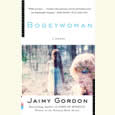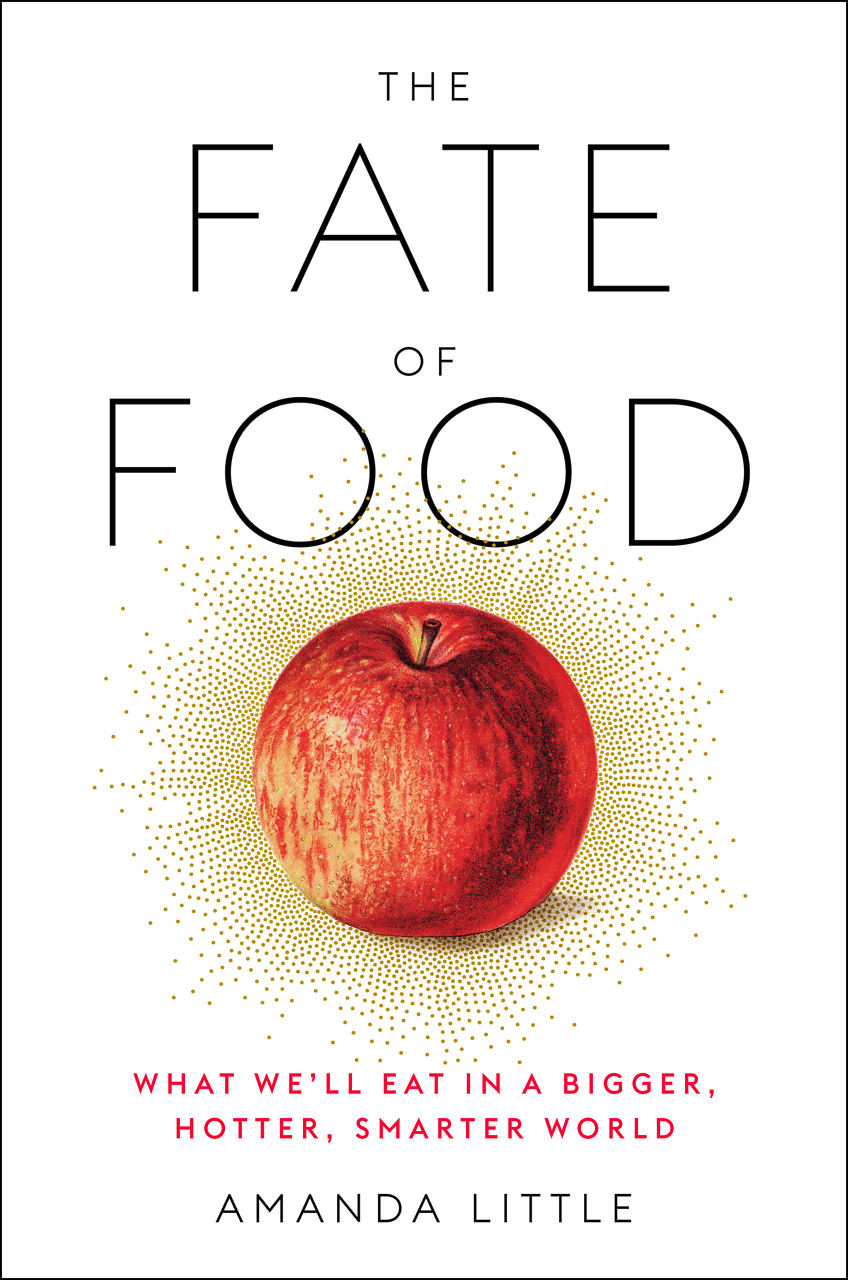No Sophomore Slump
With an international prize and a new six-figure book deal, the good news just keeps coming for Ruta Sepetys
Between Shades of Gray, the debut novel by Nashville author Ruta Sepetys, is a publisher’s wildest dream come true. First came a perfect set of starred pre-publication reviews (from Booklist, Publisher’s Weekly, Library Journal, and Kirkus Reviews); then came raves from critics all over the world. The book was a New York Times bestseller the week it hit shelves in March, and it has been published in Australia, Brazil, China, Croatia, Finland, France, Germany, Greece, Holland, Hong Kong, Hungary, Italy, Japan, Korea, Latvia, Lithuania, Macau, Poland, Portugal, Serbia, Slovakia, Spain, Sweden, Taiwan, Thailand, Turkey, and the UK—so far. On November 29 at a gala at the Petit Palais hosted by the French literary magazine Lire, Sepetys became the first American author to win the prestigious Prix RTL-Lire, a prize for the best novel for young people published in the last year.
“Many beautiful books that tell important stories do not ultimately reach the readers who were meant to find them,” Beth Kephart, writing in Publishing Perspectives, points out in an article marveling at the astonishing international success of Between Shades of Gray. Sepetys’s novel, which tells the harrowing tale of fifteen-year-old Lina, a Lithuanian girl arrested by Stalin’s secret police and deported to a series of ever-harsher Siberian work camps, is clearly an exception. In addition to the French prize, Between Shades of Gray has also been nominated for the 2012 Carnegie Medal; the winner of that award will be announced next June.
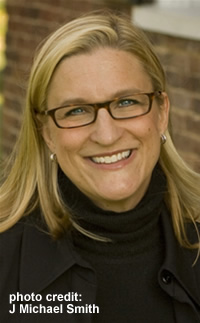 Now Sepetys, who spent five years immersed in research for Between Shades of Gray, has signed a six-figure, two-book contract to continue with Philomel, a division of Penguin. Chapter 16 interviewed the author, fresh from the Paris gala, by email about her literary influences, the connections she’s forged with the descendants of Baltic refugees or deportees, and the much-discussed “darkness” of literature pitched to an adolescent audience.
Now Sepetys, who spent five years immersed in research for Between Shades of Gray, has signed a six-figure, two-book contract to continue with Philomel, a division of Penguin. Chapter 16 interviewed the author, fresh from the Paris gala, by email about her literary influences, the connections she’s forged with the descendants of Baltic refugees or deportees, and the much-discussed “darkness” of literature pitched to an adolescent audience.
Chapter 16: First of all, congratulations on the absolutely stunning critical and commercial success of Between Shades of Gray. In the novel’s moving epilogue, you beseech readers and teachers to tell the story of Stalin’s millions of massacred victims, and now your own book is doing a marvelous job of spreading the word. On your travels, have other Lithuanians approached you to talk about what was, until recently, forbidden to discuss?
Sepetys: Thank you for your kind words! Yes, I’ve met many Lithuanians, Latvians, and Estonians who are now eager to share their stories. I’ve also received countless emails from families who were affected by the deportations. Their stories are shocking, sad, but many are also miraculous. It would be wonderful if a volume containing real survivor stories could be published in English.
Chapter 16: Your father came to the States from Lithuania—an experience you came to appreciate, according to a recording you made for NPR’s All Things Considered, when you were on assignment in Malaysia and found yourself “constantly lost,” confused by the currency, and incapable of communicating with locals. Has writing about your Lithuanian heritage helped you to understand the hurdles faced by immigrants, particularly immigrants fleeing political danger, as your father did?
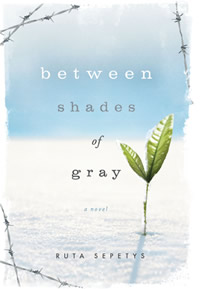 Sepetys: My Lithuanian heritage has been a large part of my identity. Growing up in the U.S. with a name like Ruta Sepetys always sparked questions. I was constantly responding with, “I’m Lithuanian.” Even though that was my response, I wasn’t familiar with all of Lithuanian history—certainly not the deportations. Writing the book has allowed me to explore my heritage on a deeper level, and, yes, it gave me a tremendous appreciation for the challenges faced by displaced persons, immigrants, and refugees.
Sepetys: My Lithuanian heritage has been a large part of my identity. Growing up in the U.S. with a name like Ruta Sepetys always sparked questions. I was constantly responding with, “I’m Lithuanian.” Even though that was my response, I wasn’t familiar with all of Lithuanian history—certainly not the deportations. Writing the book has allowed me to explore my heritage on a deeper level, and, yes, it gave me a tremendous appreciation for the challenges faced by displaced persons, immigrants, and refugees.
Chapter 16: Do you see yourself as solely a writer for young-adult readers? How would your stories change if they were written specifically for adults?
Sepetys: Although I am extremely passionate about writing for young adults, I don’t see myself solely as a YA writer. In many countries, Between Shades of Gray is published as an adult novel, and when I toured in those countries I was meeting with adult readers. If I wrote stories specifically for adults I think the only thing that would change is that the main character would be an adult rather than a teenager. I love serious, sad stories so the content of my books is already dark enough.
Chapter 16: YA fiction has recently been criticized for being “too dark.” At first glance, the genre does seem to burst at the seams with tragedies, violent and bitter sagas, and angst-ridden chronicles. Between Shades of Gray certainly earns its darkness, but do you find any truth in the notion that there’s not enough light in literature aimed at teenagers?
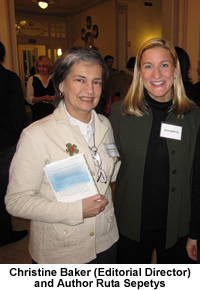 Sepetys: I’m probably biased because I love dark stories, but I think books are a safe and valuable way to explore difficult topics. I read Go Ask Alice when I was a teen and it absolutely terrified me—so much that I vowed never to go near drugs. I’m grateful I learned that lesson through a book. I think there are a lot of wonderful books for teenagers with uplifting themes and lighthearted humor. And I’ve met some incredible teachers and librarians who carefully choose and recommend books to students based on their individual interests, home life, and emotional development.
Sepetys: I’m probably biased because I love dark stories, but I think books are a safe and valuable way to explore difficult topics. I read Go Ask Alice when I was a teen and it absolutely terrified me—so much that I vowed never to go near drugs. I’m grateful I learned that lesson through a book. I think there are a lot of wonderful books for teenagers with uplifting themes and lighthearted humor. And I’ve met some incredible teachers and librarians who carefully choose and recommend books to students based on their individual interests, home life, and emotional development.
Chapter 16: What books did you love as a girl; which books and authors influenced you most?
Sepetys: Are you ready for this? My favorite book as a young girl was [Edith Wharton’s] Ethan Frome. A sad and pitiful man falls in love with his wife’s cousin. In order to be together forever they attempt a double suicide by sledding into a tree. They both wind up crippled and bitter. The end. Oh, how I loved that book. I read it over and over. Ethan Frome was published in 1911, so clearly tragic and dark stories have been around for a while. I’ve always loved Edith Wharton, Truman Capote, and Ellen Gilchrist.
Chapter 16: The novel you’re currently writing is also based on events in your family history. Can you divulge a bit about its plot? What inspired the idea, and when did you decide this would be your next book?
Sepetys: My third novel is the one tied to a bit of family history. During WWII, my father’s cousin was supposed to be on board a ship that sank tragically during Operation Hannibal. I’m starting on that novel now. My next book is set in New Orleans in 1950. The daughter of a French Quarter prostitute attempts to get into one of the “Seven Sister” colleges but soon finds herself part of a criminal investigation. I spent a lot of time in New Orleans doing research. You wouldn’t believe what I found under the rocks I turned over. Brothels, mafia, oh my! The book is finished, and I’m really excited about it.
Chapter 16: And can you describe your research process for the next book? Will it be as exhaustive and extensive as your research for Between Shades of Gray?
Sepetys: The research might be more extensive for the third book because there is a lot of existing documentation on Operation Hannibal, and the survivors are spread out all over the world. I will start with a research trip to Poland in late spring.
Read Chapter 16’s review of Between Shades of Gray here.



